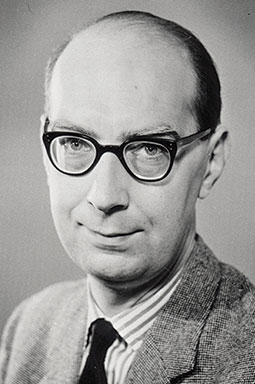



PHILIP LARKIN
BIOGRAPHY
Philip Arthur Larkin was born on August 9, 1922, in Coventry. He was the second child, and only son, of Sydney and Eva Larkin. Sydney Larkin was City Treasurer between the years 1922-44. Larkin’s sister, some ten years his senior, was called Catherine, but was known as Kitty.
He attended the City’s King Henry VIII School between 1930 and 1940, and made regular contributions to the school magazine, The Coventrian, which, between 1939 and 1940, he also helped to edit .
After leaving King Henry VIII, he went to St. John’s College, Oxford, and despite the war (Larkin had failed his army medical because of his poor eyesight), was able to complete his degree without interruption, graduating in 1943 with First Class Honours in English. His closest friends at Oxford were Kingsley Amis and Bruce Montgomery.
The first of his poems to be published in a national weekly was ‘Ultimatum’, which appeared in the Listener, November 28, 1940. Then in June 1943, three of his poems were published in Oxford Poetry (1942-43) . These were ‘A Stone Church Damaged By A Bomb’, ‘Mythological Introduction’, and ‘I dreamed of an out-thrust arm of land’.
After graduating, Larkin lived with his parents for a while, before being appointed Librarian at Wellington, Shropshire, in November of 1943. Here, he studied to qualify as a professional librarian, but continued to write and publish. In 1945, ten of his poems, which later that year would be included in The North Ship, appeared in Poetry from Oxford in Wartime.
Two novels, Jill and A Girl in Winter were published in 1946 and 1947 respectively.
In 1946, Larkin became assistant Librarian at the University College of Leicester. He completed his professional studies and became an Associate of the Library Association in 1949. In October 1950, he became Sub-Librarian at Queen’s University, Belfast. It was in Belfast that he applied fresh vigour to his poetry activities, and, in 1951, had a small collection, XX Poems, privately printed in an edition of 100 copies. Also, in 1954, the Fantasy Press published a pamphlet containing five of his poems. The Marvell Press, based in Hessle, near Hull, published ‘Toads’ and ‘Poetry of departures’ in Listen. It would be the Marvell Press that published his next collection The Less Deceived.
Larkin took up the position of Librarian at the University of Hull on March 21, 1955, and it was in October of that year that The Less Deceived was published. It was this collection that would be the foundation of his reputation as one of the foremost figures in 20th Century poetry.
 It wasn’t until 1964 that his next collection, The Whitsun Weddings was published. Again, the collection was well received, and widely acclaimed, and the following year, Larkin was awarded the Queen’s Gold Medal for Poetry.
It wasn’t until 1964 that his next collection, The Whitsun Weddings was published. Again, the collection was well received, and widely acclaimed, and the following year, Larkin was awarded the Queen’s Gold Medal for Poetry.
It was during the years 1961-71 that Larkin contributed monthly reviews of jazz recordings for the Daily Telegraph, and these reviews were brought together and published in 1970 under the title All What Jazz: a record diary 1961-1968. He also edited the Oxford Book of Twentieth Century English Verse, which was published in 1973.
His last collection High Windows was published in 1974, and confirmed him as one of the finest poets in English Literary history. ‘Aubade’, his last great poem, was published in The Times Literary Supplement in December 1977. If this had been the only poem Larkin had ever written, his place in English poetry would still be secure.
A collection of his essays and reviews was published in November 1983 as Required Writing: miscellaneous pieces 1955-1982, and won the W.H. Smith Literary Award for 1984.
Larkin received many awards in recognition of his writing, especially in his later years. In 1975 he was awarded the CBE, and in 1976 was given the German Shakespeare-Pries. He chaired the Booker Prize Panel in 1977, was made Companion of Literature in 1978, and served on the Literature Panel of the Arts between 1980 and 1982. He was made an Honorary Fellow of the Library Association in 1980. In 1982 the University of Hull made him a Professor.
In 1984 he received an honorary D.Litt. from Oxford University, and was elected to the Board of the British Library. In December of 1984 he was offered the chance to succeed Sir John Betjeman as Poet Laureate but declined, being unwilling to accept the high public profile and associated media attention of the position.
In mid 1985 Larkin was admitted to hospital with an illness in his throat, and on June 11 an operation was carried out to remove his oesophagus. His health was deteriorating, and when he was awarded the much prized Order of the Companion of Honour he was unable, because of ill health, to attend the investiture, which was due to take place at Buckingham Palace on November 25. He received the official notification courtesy of the Royal Mail.
Philip Larkin died of cancer at 1.24 a.m. on Monday December 2 1985. He was 63 years old.
By James L. Orwin



